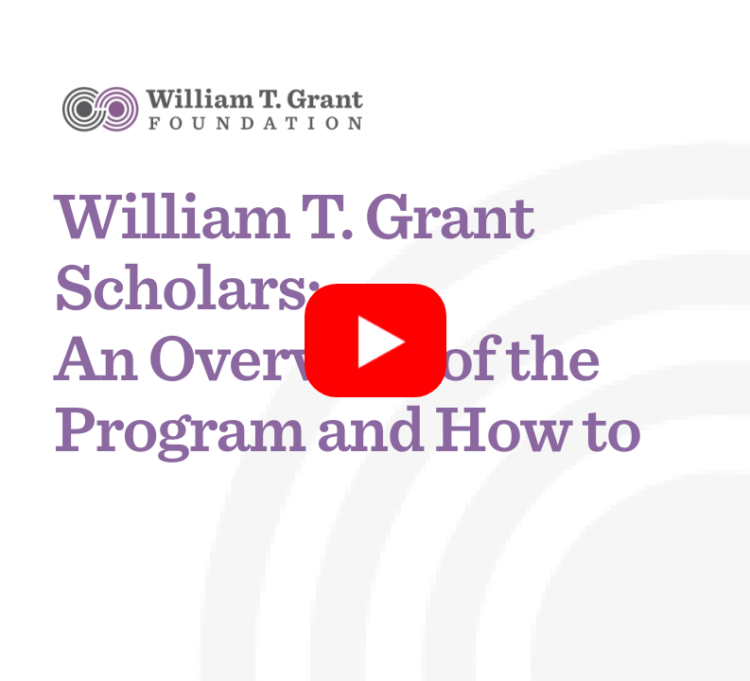The Foundation is proud to announce the newest class of William T. Grant Scholars:
- Farzana Adjah, in the graduate school of education at Stanford University, will examine whether an intervention that equips youth to resist stress and trauma from racism can improve short- and long-term adjustment and academic outcomes.
- Kelly Harris, in the department of occupational therapy at Washington University in St. Louis, will investigate whether a technology-enabled platform that coordinates between medical and education settings can improve health and academic outcomes for Black youth with asthma.
- Irene Lo, in the department of management science and engineering at Stanford University, will research whether a student assignment policy with both zones and controlled choice can reduce racial and economic segregation in public schools.
- Mollie McQuillan, in the department of education leadership and policy analysis at the University of Wisconsin, Madison, will explore how district administrators use gender- and sexual-diversity education reform research to improve LGBTQ+ student outcomes.
- Ericka Weathers, in the division of policy, organizations, leadership, and systems within the Graduate School of Education at the University of Pennsylvania, will study whether institutional responses to truancy reduce inequality in educational outcomes for Black and Latinx students.
Launched in 1982, the Scholars Program supports the professional development of promising early-career researchers. To date, the program has sponsored more than 200 talented researchers.
As part of the Foundation’s commitment to supporting the career development of junior researchers, this year’s Scholars will be the first to receive an award of $425,000—an increase from the previous amount of $350,000.
With this award, Scholars will execute rigorous five-year research plans that stretch their skills and knowledge into new disciplines, content areas, or methods. “As you transition into the professoriate, it’s harder and harder to have the time and space to improve your methodological skills in a way that is really intensive,” said McQuillan, an education policy scholar who will develop expertise in survey development and relational and cognitive processes involved in how school-based organizational routines influence students. “I’m really grateful for the opportunity [to do so] and improve how I understand how policies and programs influence educators and kids.”
As an operations researcher, Lo’s Scholars project will stretch her knowledge on human-centered participatory design and policy measurement and evaluation. “When I started working on school assignment and working closely with the school district, I realized how important it is to go beyond the algorithm design and engage with participants, especially on an issue as contentious and deeply personal as where students go to school,” she said. “I’m grateful that William T. Grant explicitly looks for this … where the nature of the problem itself requires us to go beyond our existing areas of expertise.”
Recognizing that early-career researchers are rarely offered support to take measured risks in their work, the award also includes funding for mentorship from experts in areas pertinent to Scholars’ development. “One of the most exciting components of this award, to me, is that [it] encourages the development of new relationships, strengthening newer relationships [and] deepening them,” said Harris, who will receive guidance from her mentors Adam Wilcox at Washington University in St. Louis and Tamara Perry at the Arkansas Children’s Hospital Research Institute. “This is an opportunity to work both with someone who is at my institution, who has this expertise of informatics … [and] develop a relationship with someone outside of my institution who has wonderful expertise working with youth with asthma.”
Adjah’s mentors, Adriana Umaña-Taylor at Harvard University and Gabriela Livas Stein at the University of Texas, Austin, will help strengthen her ability to conduct school-based, randomized controlled trials and apply interventions within and across racial-ethnic groups. “[My mentors and I] have similar values in terms of having our research support and be informed by the community,” she said. As Adjah embarks on her Scholars project, the mentorship she receives will allow her to bridge the gap “between doing rigorous community-based, school-based intervention work, but also really making sure that we’re integrating youth and adult voices … I’m excited to be able to work with my mentors who have expertise in that area and have done that really well.”
Scholars will also have opportunities to further their research and professional development through annual retreats and workshops with fellow Scholars, Foundation staff, and other senior researchers. For Weathers, whose Scholars project on institutional responses to truancy will stretch her knowledge of critical methods, “being exposed to more critical communities that can help inform my knowledge in this area, working with my mentors, and having the William T. Grant Scholars network, [will] all be really helpful,” she said. “Having that network is going to be key, where I can not only receive support, but also be of support to a community of scholars who are working to achieve similar goals [of] reducing racial inequality along different topic areas and research questions.”
“This year’s Scholars bring a diverse range of expertise and backgrounds, and their work will greatly contribute to our understanding of ways to address inequality and improve youth outcomes. We are excited for them to join our community of Scholars and look forward to supporting their growth as researchers,” said Senior Program Officer Melissa Wooten, who manages the program.








